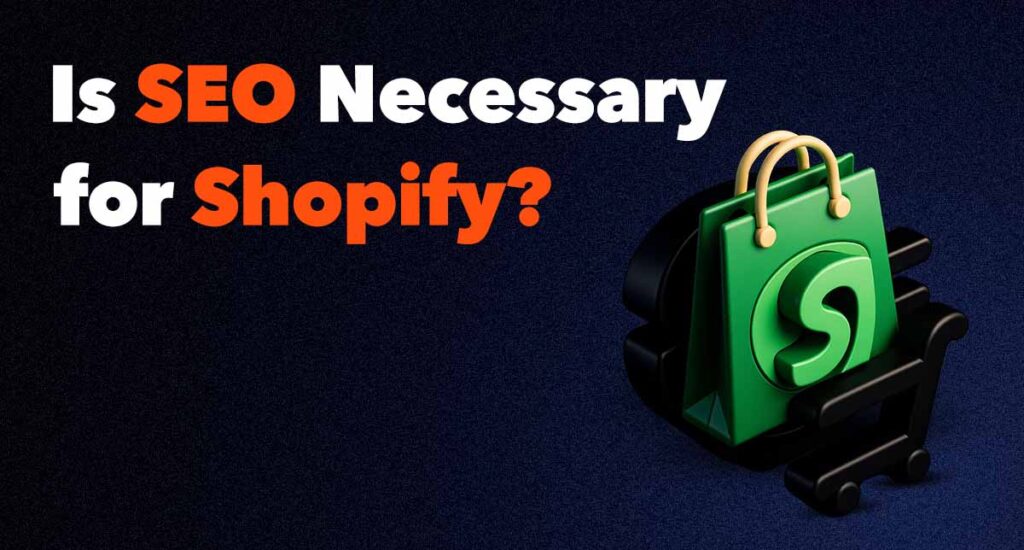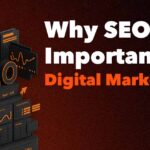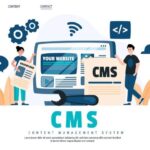Shopify is one of the most popular eCommerce platforms in the world. So, optimizing your Shopify store for SEO is very important and helpful. So, yes absolutely: SEO is necessary for Shopify and its online shops. With over 4.5 million active online stores on Shopify, the competition is fierce. Even global brands like Red Bull and Netflix rely on Shopify for their online sales. That means you also need to make sure your Shopify store is well-optimized to stand out.
SEO for Shopify means targeting the right keywords, optimizing metadata, using the built-in blog feature, and driving organic traffic. In this blog from HDM Agency, we’ll explore how to optimize your Shopify SEO, what tools and steps to use, and which key tips to follow. So, if you think about “Do I need SEO for Shopify?” read this Guide.
What SEO for Shopify Really Involves?
Having a store on Shopify is just the beginning. To bring in customers and grow your sales, you need more than just a good-looking website. SEO helps your store get found on Google and other search engines. It’s about making your content and structure friendly for both users and search engines. Many store owners forget that design mistakes can hurt SEO; learn more about common web design mistakes that affect visibility.
If you still think that “Do I need SEO for Shopify?”, let’s look at four key parts of SEO for Shopify that you should focus on:
Keyword Targeting and Content Strategy
To get noticed, you need to use the same words your customers are searching for. This means researching keywords that match your products, like “modest abaya Dubai” or “best oud perfume in UAE.” Then, you use these keywords in your product titles, descriptions, and blog posts. For example, if you sell perfumes, writing a blog about “Top 5 Oud Perfumes for Summer in Dubai” can bring in users searching for those exact terms. Content isn’t just text; it’s how you attract real people with real interests.
Metadata Optimization
Meta titles and descriptions are what people see on search engine results pages. A good meta title tells users what your page is about. A strong meta description invites them to click. For example, instead of just “Luxury Kandora,” a better title would be “Buy Luxury Kandora in Dubai – Free Shipping | YourBrand.” Shopify lets you edit metadata for every page, so don’t skip this step. It may seem small, but it directly affects click-through rate and SEO ranking.
Blog and Internal Linking
Shopify includes a built-in blog feature — use it! Blogging helps you share useful content, answer common questions, and link back to your product pages. For instance, a blog post titled “How to Choose the Right Oud for Every Occasion” can naturally link to your oud collection. This improves internal linking and helps search engines understand your site structure. More than that, it helps customers stay longer on your site and trust your expertise.
Image Optimization and Speed
Images are key in eCommerce, especially for visual products like clothing or accessories. But large image files can slow your site down and slow sites hurt your rankings. Always compress your images before uploading them to Shopify. Also, use descriptive ALT text like “gold embroidered bisht for men UAE” to help Google understand what’s in the image. Fast-loading, optimized images improve both user experience and SEO results.
Does Shopify improve your SEO ranking Automatically?
No, Shopify doesn’t boost your SEO rankings by itself. It’s just a platform; a good one, but it won’t do the work for you. To see real results, you need an expert who understands SEO and knows how to apply it to your store. Think of it like owning a luxury car: just having it doesn’t win races — you need a skilled driver. Many store owners ask what are SEO services?; and the answer is: these are specialized actions that help your website rank higher on search engines like Google. By the way, it’s a crucial question that Does Shopify improve your SEO ranking?
Let’s explore five essential things an SEO expert does to optimize a Shopify store:
- Conduct Keyword Research: An SEO expert finds the most relevant and high-traffic keywords for your products and market. This helps match your content with what real people are searching for in your region. For example, terms like “modest fashion UAE” or “date syrup online Dubai.”
- Optimize Technical Structure: They work on your store’s structure, making sure it’s easy for search engines to crawl. This includes fixing broken links, creating clean URLs, and submitting your sitemap to Google Search Console.
- Improve On-Page SEO: This means editing titles, meta descriptions, headers, and product descriptions to include targeted keywords. It also involves organizing your content with clear headings and making sure each page has a unique focus.
- Enhance User Experience (UX): An expert ensures your site is mobile-friendly, loads fast, and is easy to navigate. A smooth experience keeps users engaged and reduces bounce rates — both important signals for search engines.
- Track Performance and Adjust Strategy: They use tools like Google Analytics and Shopify reports to monitor your traffic and rankings. Based on the data, they refine your strategy. For example, updating old blogs or shifting focus to trending keywords in your market.
Why Basic Shopify SEO Settings Aren’t Enough?
Shopify gives you some built-in SEO tools, like editing meta titles, descriptions, and URLs. These are helpful, but they only scratch the surface. Just filling in a title tag or writing a short description doesn’t guarantee your pages will rank high on Google. You need a full SEO strategy to stand out in the crowded Shopify market.
To really grow your store, you must go beyond the basics. This means doing keyword research, writing SEO-friendly content, building internal links, and improving site speed. It also includes using structured data and updating your blog regularly. Think of the default settings as a starting point; the real results come when you dig deeper and apply advanced techniques.
Common Shopify SEO Mistakes (and How to Avoid Them)
Many store owners try to handle SEO on their own. While it’s great to learn, doing it without proper knowledge can cause more harm than good. That’s why professional SEO services are important and they help you avoid common mistakes and apply best practices tailored to your market. Here are some of the most frequent SEO errors we see on Shopify stores, and how you can fix them:
- Ignoring Keyword Research: Many new store owners write product titles and descriptions based only on what they think sounds good. But you need to write based on what your customers are searching for. For example, instead of “Luxury Scent X,” use “Best Oud Perfume for Men in Dubai”. It’s what users type into Google.
- Using Duplicate Content: Some shop owners copy content from other sites or even reuse the same text across their own pages. Google sees this as a red flag. Each product or page should have original, helpful content. If you’re selling similar items, describe the unique features or uses of each one.
- Poor Mobile Experience: Shopify stores that don’t work well on mobile lose both users and rankings. Your site must be fast, clean, and easy to use on smartphones. Imagine someone in the UAE browsing your abaya collection on their phone; if images don’t load or buttons are too small, they’ll leave.
- Skipping Image Optimization: Uploading large, high-resolution images without compressing them slows down your site. This frustrates users and lowers your ranking. Use tools to compress your images and always add ALT text, like “embroidered abaya for women in Abu Dhabi.”
- Not Using Blog Content: Some store owners ignore the blog feature in Shopify. But blogging is a great way to drive traffic and include keywords. A simple post like “Top 3 Hijab Styles for Summer in UAE” can link to your products and attract people searching for fashion ideas.
- Forgetting to Submit Sitemap: If Google doesn’t know what pages your site has, it can’t index them. Shopify creates a sitemap automatically, but you still need to submit it to Google Search Console. This helps Google discover your new pages faster.
- No Ongoing SEO Maintenance: SEO is not a one-time task. Algorithms change, trends shift, and new competitors arrive. If you don’t regularly update your content and strategy, your rankings will drop. Regular checkups by an SEO specialist help you stay ahead of the curve.
- Not Setting Up 301 Redirects: When you delete or change a product URL, not setting up a 301 redirect means users and Google hit a dead end. This causes broken links and hurts your SEO. For example, if you remove a kandora page but don’t redirect it to a similar product, users searching for it will see a 404 error and likely never return.
- Overusing Pop-Ups or Interstitials: Pop-ups can be useful, but too many or poorly timed ones create a bad user experience. Google also penalizes mobile sites with intrusive interstitials. Imagine a visitor from Abu Dhabi trying to view your perfume collection but getting blocked by full-screen pop-ups asking them to sign up or download something. They’ll leave quickly and your bounce rate will go up.
- Ignoring Image ALT Text: ALT text helps visually impaired users and tells Google what the image is about. Many store owners skip this step. But adding ALT text like “silver embroidery abaya for Ramadan” helps improve image SEO. Especially in visual-heavy niches like fashion, optimizing ALT tags makes a real difference in organic traffic.
- Not Updating Outdated Content: Old blog posts or product pages with outdated info can hurt credibility and rankings. An SEO agency regularly audits content and updates it to match current search trends. For example, if you wrote a blog in 2022 about “Top Eid Gifts,” updating it for 2025 keeps it relevant and competitive on search engines.
How an SEO Agency Can Optimize Your Shopify Store?
If you’re serious about growing your Shopify store, working with an SEO agency can make a big difference. While Shopify gives you a strong base, it takes expert work to truly stand out. Many business owners ask “is SEO really worth it?“ and the answer is yes, especially when it’s done by professionals who understand how to grow your traffic and increase your sales. Let’s look at five key SEO services an agency can offer to improve your Shopify store performance:
- 1. Speed Optimization: Website speed matters; both for users and for search engines. An agency will compress images, remove unnecessary code, and set up proper caching to boost your page loading time. For example, imagine a customer in Abu Dhabi browsing your store on a mobile connection. If your site takes too long to load, they’ll leave before even seeing your products.
- 2. URL Structure Improvement: Clean, keyword-friendly URLs help both users and Google understand what your page is about. Instead of “yourstore.com/product123,” an optimized URL would look like “yourstore.com/oud-perfume-dubai.” A clear structure also improves navigation and builds trust, especially in competitive markets like the UAE.
- 3. Internal and External Link Building: Link building is a core part of SEO. An agency will add smart internal links between your blog posts and product pages. They’ll also work on external links by getting other reputable websites to mention your store. For example, if a local fashion blog in Dubai links to your abaya collection, it sends a strong SEO signal to Google.
- 4. Targeted Content Creation: Agencies create content that’s designed to rank and convert. This includes blog articles, product guides, and landing pages with high-ranking keywords. For instance, they might write an article titled “Best Gift Ideas for Eid in the UAE” and naturally link to your gift bundles.
- 5. Technical SEO Setup and Fixes: Many Shopify stores have hidden technical issues like broken links, duplicate pages, or missing tags. An agency will audit your site and fix these issues to make sure everything runs smoothly. This ensures search engines can crawl and index your pages properly — which leads to better rankings over time.
- 6. Mobile Optimization: In the UAE, most online shoppers use mobile devices. An SEO agency ensures your Shopify store looks and works great on smartphones. This includes responsive design, readable fonts, fast loading, and easy navigation. If a customer in Dubai opens your store on their phone and everything works smoothly, they’re more likely to stay and buy.
- 7. Structured Data Markup: Structured data helps Google understand what your pages are about. An agency can add rich snippets like product price, stock status, reviews, and ratings. For example, if someone searches for “luxury kandora in UAE,” your product might show up with stars, prices, and availability — increasing your click-through rate.
- 8. Local SEO Optimization: If you sell in specific areas like Dubai, Sharjah, or Abu Dhabi, local SEO is a must. An SEO agency will optimize your store for local search terms, set up your Google Business Profile, and create content with local intent. For example, they may target phrases like “buy oud perfume in Dubai” or “abaya shop in Sharjah.”
- 9. SEO Performance Tracking & Reporting: An agency constantly tracks your SEO progress. They monitor keyword rankings, traffic growth, bounce rate, and sales performance. Based on the data, they adjust your strategy to get better results. Here’s a comparison table showing how DIY SEO vs. Agency SEO tracking usually works:
| Important Features | DIY SEO | SEO Agency |
| Keyword Monitoring | Basic (manual) | Advanced (automated tools) |
| Traffic Analysis | Limited (Google only) | In-depth (multi-source) |
| Competitor Tracking | Rarely done | Regular updates |
| Reporting | Not consistent | Weekly or monthly reports |
| Strategic Adjustments | Based on guesswork | Based on real data |
- 10. Conversion Rate Optimization (CRO): Bringing traffic is not enough; converting visitors into customers is the goal. An SEO agency looks at user behavior, heatmaps, and product page structure to suggest changes that boost sales. For example, they may recommend reordering sections, improving your CTA buttons, or simplifying your checkout page for UAE users who expect fast, smooth experiences.
- 11. App & Plugin SEO Configuration: Shopify stores often rely on apps for reviews, pop-ups, live chat, and more. But too many apps, or poorly configured ones, can slow down your site and create SEO issues. An agency checks your installed apps and makes sure they don’t harm your speed, user experience, or crawlability. For example, if you use a review app that generates duplicate product URLs, that can confuse search engines.
- 12. Multilingual & Multiregional SEO: If your store targets different languages or countries, SEO gets more complex. An SEO agency can implement hreflang tags to show the right version of your site to users in the UAE, Saudi Arabia, or other Gulf regions. For instance, if a user in Dubai prefers English and another in Riyadh prefers Arabic, Google needs to know which page to show each of them. This boosts visibility and avoids duplicate content penalties.
- 13. Conversion Funnel Optimization: Driving traffic is one thing; turning visitors into buyers is another. An agency analyzes your customer journey from homepage to checkout. They’ll find drop-off points and suggest improvements. Maybe your product pages are great, but your cart page loads slowly or lacks trust signals like delivery info. Fixing these can increase your conversion rate.
- 14. Schema for Local Business & FAQs: Adding structured data like LocalBusiness, Product, FAQ, and Breadcrumb helps Google understand your store better. It also enhances your search result with rich snippets like star ratings, availability, and Q&A sections. For example, if you add an FAQ schema to your perfume product page, it could appear directly in Google search results, answering common questions before users even click.
- 15. Backlink Quality Audit: Backlinks are powerful, but only if they’re high quality. An SEO agency reviews your current backlinks and removes or disavows toxic ones. This protects your site from spam penalties and improves your domain authority. For example, if a UAE blog links to your abaya store, that’s helpful. But links from low-quality or unrelated sites can do more harm than good.
Benefits of Outsourcing SEO for Shopify Stores
Outsourcing your SEO means saving time and getting expert results. You focus on running your business — we handle the technical work. At HDM Agency, we specialize in SEO for Shopify. We know how to rank your products, grow your traffic, and bring more sales through smart, data-driven strategies. From keyword research to blog content, we take care of it all.
Here are most important actions we take as a Shopify SEO agency:
- Full SEO audit of your Shopify store
- Keyword and competitor analysis
- Content creation and blogging strategy
- Link-building campaigns and outreach
- Ongoing tracking, reporting, and SEO strategy updates
- On-page optimization for product and collection pages
Let Your Shopify Store Be Seen; The Right Way
SEO for Shopify is not just a trend, it’s a must. With thousands of active stores, getting noticed on Google takes more than just launching a site. You need targeted keywords, technical optimization, mobile performance, and smart content. And that’s exactly what a professional agency can do for you. Want to grow your store and reach more customers in the UAE? Let’s talk. Contact our HDM UAE branch at +971 56 26 01 368 or fill out the consultation form on our website. We’re ready to help your Shopify store succeed; step by step.
Frequently Asked Questions (FAQ)
- Can I do Shopify SEO on my own without hiring an agency?
Yes, but results may take longer and require learning SEO tools and techniques. Without experience, you may also make mistakes that hurt your rankings.
- How long does it take to see SEO results on Shopify?
Usually, it takes 4 to 8 weeks to notice significant improvements. SEO is a long-term investment, not an instant solution.
- Do Shopify themes affect SEO performance?
Yes. Some themes are better optimized for speed and mobile than others. Choosing a clean, lightweight theme helps your SEO.
- Is blogging really important for Shopify SEO?
Absolutely. Blogging allows you to target long-tail keywords, answer customer questions, and improve internal linking; all great for SEO.
- Can SEO help reduce paid ad spending?
Yes. As organic traffic grows, your reliance on paid ads can decrease. This means better ROI over time and lower marketing costs.
- Do I need SEO for Shopify?
Yes, you definitely need SEO for your Shopify store. Just having a store online is not enough. SEO helps your store get found by people searching for your products.








